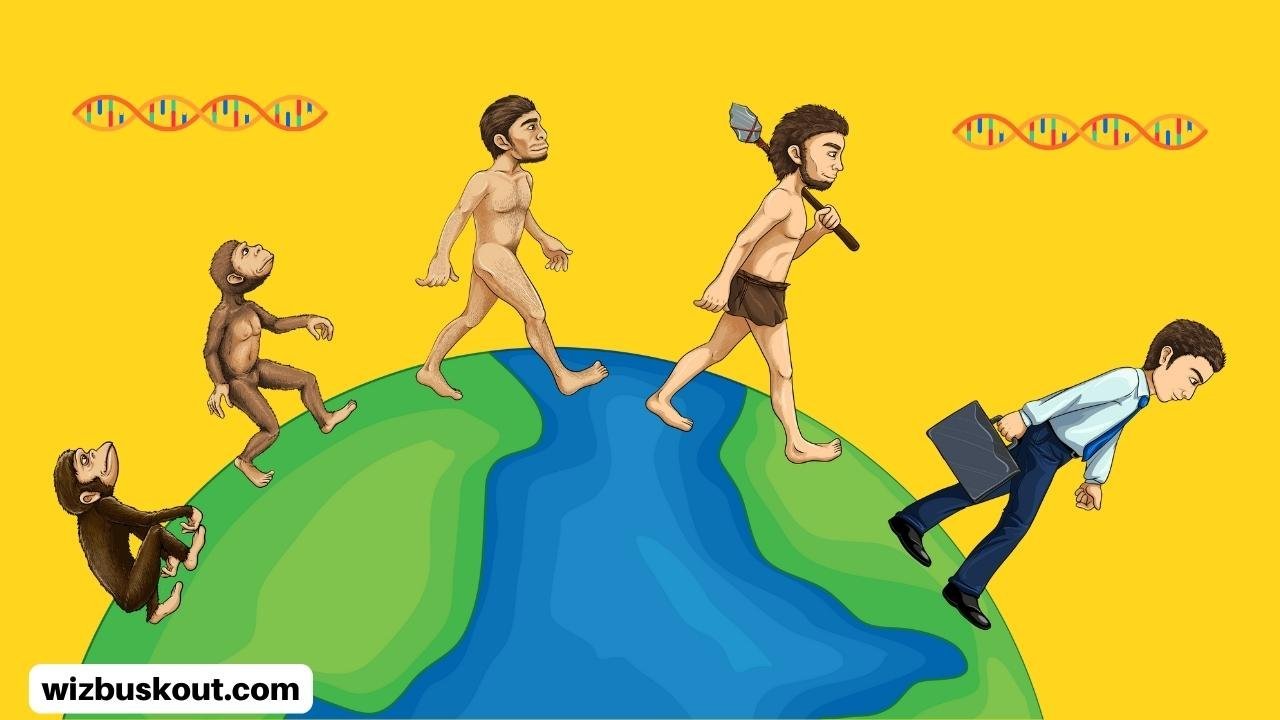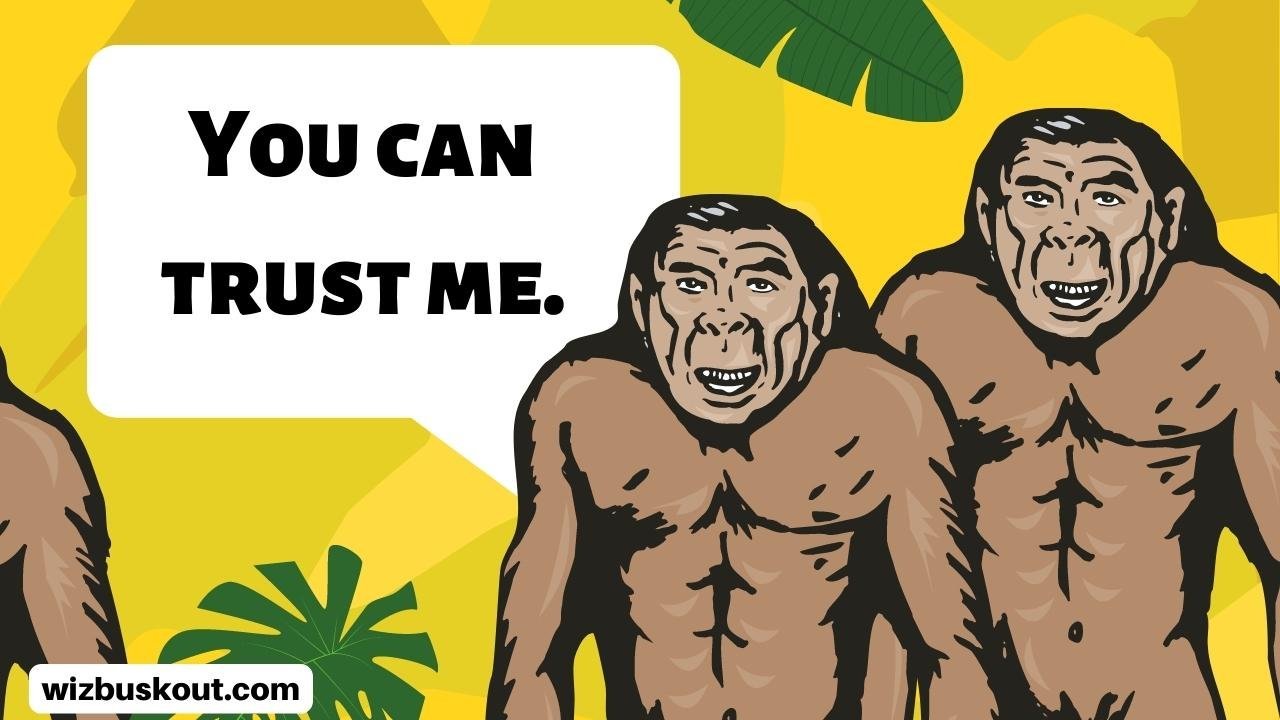The Moral Animal by Robert Wright discusses evolutionary psychology and investigates whether our genes have made us the way we are today, or is it our conscience that helped us adapt to circumstances and molded our behaviors by introducing virtues and morality.
The Moral Animal Summary
Have you ever thought about why all humans desire status?
Where did humans learn morality if we all are social animals?
Why do most people form communities and worry so much about their relationships?
In this book summary, I’ll share some of the best lessons from the book The Moral Animal, that will help you figure out answers to these perplexing questions.
Alrighty, so without further ado, let’s dive in.
Note: The book talks about history, about the time when Darwin was young, about primates, about evolution, and therefore many ideas discussed here might not be relevant today. Some of them may even sound opinionated. But a lot of them still affect our lives in so many ways that we don’t realize it.
Keep in mind: These aren’t my personal ideas, they come from the theories I studied in this book and the research I do regularly by reading books.
Lesson #1: Genes multiply through natural selection and impact our behaviors.

Darwin’s theory of evolution suggests that we all are the products of our genes.
All our behaviors and feelings carry the agenda of genes that want only one thing: Self-preservation.
And for genes to proliferate, we must act in such a way that they multiply and survive.
Reproduction plays an important role in this.
It helps genes to ensure their survival by multiplying.
All the traits in any species that allow genes to spread flourish more compared to those that don’t allow them to survive.
For example, status and power.
Those with higher status often have more power and are more likely to survive.
The better status also means that males would get more females for reproduction.
The thing is:
Humans are much like Chimpanzees. After all, they are our closest ancestors.
So, a male chimp who leads the pack (the alpha male) has more authority and can choose to mate with as many females as he wants.
And that means more genes of that type will spread. The rest won’t spread that much.
Remember, chimps don’t go to school to learn about economics.
All this comes naturally to them.
This is also called natural selection.
Nature wants to preserve itself and therefore, the theory is that it creates such conditions that allow it to survive.
If a gene doesn’t spread, it’s more likely to die.
But if it creates copies of itself and creates favorable conditions, it’s more likely to survive.
That’s why Darwin believed that all of our emotions and feelings are designed in such a way that we reproduce more and produce as many offspring as we can.
All this may sound gross.
Unfortunately, that’s the wicked scheme of nature.
The author realized that genes aren’t concerned with our happiness. They only care about themselves and their agenda.
We might believe that our emotions and feelings are in our control, but they are not if you look at them from Darwin’s evolutionary lens.
For those who don’t learn about evolution and psychology, it’s believed, that genes do the thinking for them.
They unconsciously carry on the agenda of natural selection and at the same time believe that they have free will.
The author says that it’s still a matter of debate if we have free will or not.
The question is: So if we are the product of genes, where did we learn morality?
And why monogamy is getting popular over polygamy?
If there were multiple partners in a relationship, wouldn’t genes spread more and survive better?
Such questions troubled the author.
Lesson #2: Males focus on the numbers, while females focus on the quality.

When it comes to mating, males are designed to have as much sex as possible with as many partners as they can.
To understand human behavior, the author suggests that we should at the behavior of apes, gorillas, and orangutans.
Of course, they aren’t exactly like us, but many traits are common between us and them.
Males are more likely to actively search for females and have sex compared to females.
The same is the case with gorillas.
Gorillas often fight with each other to become the leader of the group.
Those who win get exclusive access to the females.
Some of them wander from one place to another to find females.
The interesting part is that they do all this unconsciously.
They don’t have any moral compass to determine and separate right from wrong.
So, as soon as they get sex, they don’t bother about the female partner. And instead, start seeking another partner.
Once the requirement of food is taken care of, their only mission is to mate as much as possible.
This may sound like a nightmare to females.
But this is the ugly agenda of natural selection that pulls the strings.
If you look at humans, you’ll find similarities.
Although we are moral animals, males don’t have less emotional investment compared to females.
Females have to carry the baby for around 9 months or so.
So, they need to choose a male partner that won’t ditch them after the reproduction phase is over.
To females, quality is more important.
It’s not like males aren’t concerned about the quality, it’s just that natural selection has designed males in such a way that they are more likely to focus on numbers.
The author also discusses how many people used to sleep with other women in the Victorian era and cheating was very common.
Even today, the existence of prostitution suggests that this theory of natural selection might be true.
Of course, there are plenty of nuances to this and many unanswered questions.
Let’s dig deeper to find out more.
Lesson #3: Men desire beautiful women, while women desire resourceful men.

Well, this isn’t true that much in today’s time.
Remember, we are looking at human evolution and trying to understand how we are the way we are.
So during Darwin’s times, and before that, the purpose of every man, consciously or unconsciously, was to seek beautiful women.
Yes, those weren’t the times of equality.
Life wasn’t fair back then.
Beautiful women would get to choose the alpha male with lots of resources.
While the alpha male would get to pick young and beautiful women.
Do you know why this was so?
Why would men and women show different behaviors?
As we discussed, when it comes to sexual relationships, men don’t care about the IQ of the women, they care much more about the superficial beauty of the women.
In fact, if a woman has a higher IQ than the man, it’ll be more of a hindrance to establishing a sexual relationship.
Women, on the other hand, don’t get to mate very often.
A man can mate almost every other day if he is not starving.
But a woman can’t mate for months after she gets pregnant.
That’s why women are choosy and concerned more about the materialistic resources that a man can provide.
It also ensures that offspring get adequate resources and live a decent life. (Natural selection)
Back then, the strength of a man was determined by his raw physical strength. So, the powerful chimps would rule.
Today, a man’s strength is judged by his influence over other people.
Politics and brains matter more today.
But still, resources are important.
No matter how intelligent, a man needs food and sex to live a good life.
With that said, if that’s what natural selection planned, when did men and women learn to cheat each other?
Isn’t cheating a bad thing?
Shouldn’t it decrease the chances of survival as it portrays betrayal?
Nobody likes to be with cheaters, right?
Also read: The way of the superior man
Lesson #4: Cheating has always existed to win resources and status.

We all want to look moral today.
But a deep dive into human evolution shows that our primate ancestors exploited others and cheated to gain unfair advantages.
For example, some women would deceive their partners and receive gifts in exchange for sex.
Also, men deceived women, made false promises and tricked women to get sex.
In short, deception has always been among humans.
Even today, people like to deceive when they see an opportunity.
The interesting thing is that nobody wants to look bad.
We care a lot about what other people think about us, as it affects our status in society.
The deceptive behavior might have come from natural selection.
Some women had more sex drive.
So, a lot of them would agree to prostitution in exchange for money.
While others had their reasons for entering such a nasty profession.
Many men practiced polygamy.
But today’s society is all about monogamy.
Many men, therefore, went to a prostitute to satisfy their desires.
One thing worth noting here is that.
The women who practiced prostitution weren’t seen as a wife in the long term by men due to trust issues.
So, although men happily slept with those types of women, they didn’t prefer to marry them.
This means that if a woman easily agreed to sex, it portrayed her as a whore. And men didn’t see them as someone they would be in a long-term relationship.
You might call it the hypocrisy of men.
Or something that natural selection planned for men.
This is because the women who sleep with a lot of men tend to get more diseases. Also, such women didn’t take care of the upbringing of their offspring, as they were interested more in money or resources.
But isn’t monogamy less favorable to genes?
Doesn’t something seem out of sync here?
Lesson #5: Polygamy might not be healthy for genes and society in the long term.

In case you don’t know the difference between monogamy and polygamy:
Monogamy is a relationship between one man and one woman.
On the flip side, polygamy is when a man has multiple women.
It might also be when a woman has multiple men, but it’s very rare to see something like that.
In most cases, men would rule the world.
So if polygamy were to happen, men would have the power to marry multiple women.
Whether polygamy is good or bad for society is a huge topic of debate.
But let’s talk about the pros and cons of it. And also take a look into why polygamy is not so common these days.
If a man has multiple wives, then other men won’t get much choice.
And there will be more competition among men.
Usually, beautiful, charming women would prefer to marry a rich man that could provide a sustainable and promising future.
Most girls won’t prefer to marry a poor man whose future is not promising.
So, it’s better if a man is limited to a single woman.
That way, all men would be able to marry at least one girl.
Another problem with polygamy was that, if let’s say 10 women marry a single man, then the resources will be divided into 10 parts. The women will be less satisfied then.
This could also affect harmony.
Although polygamy will be helpful for a woman who has no other choice than to marry a poor man. In that case, she could spend a better life by joining a polygamous relationship.
But why is it that polygamy doesn’t seem everywhere today?
Natural selection might have an answer for this.
One reason might be that children born into polygamous situations might face stressful situations and divided attention. It might also impact the development of a child adversely.
Again, there are lots of opinions on this.
Some women think that it is their right to form relationships with multiple men.
Also, for polygamous relationships to work, every partner must trust each other and have harmony, which is very difficult.
For genes to spread more, it’s better that more men marry and have sex with women. So, when a single man marries multiple wives, men would fight each other and sometimes sacrifice in battles.
You know how it’s often said that behind big fights, women are often the reason.
Today, things are different as both men and women stand with each other and hold power.
There are more options now.
Both men and women can choose out of their free will whom to marry and when.
But it’s still a mystery why polygamy ceased to exist on a wide scale.
It doesn’t mean that polygamy doesn’t exist today.
The author says that it still exists, but it’s not much evident.
Maybe morality has something to do with this change.
It’s complicated.
Lesson #6: Altruism might be a mechanism built into our minds to promote natural selection.

Humans are selfish animals.
So, where did we learn about self-sacrifice and helping others?
If you observe carefully, you’ll find we tend to love our families more than anybody else.
The closer a relative is, the more love or attachment there is.
And the longer the distance of relativity grows, the lesser the love becomes.
The author doubts that perhaps the love we carry for our sibling is not fully love.
It might be something that natural selection wanted us to do.
Again, why would natural selection put that mechanism into our brains?
What’s the point of having feelings and emotions toward other people?
The author introduces Reciprocal Altruism to answer these questions.
What is reciprocal altruism?
In layman’s language, it means “If you help me now, I’ll help you in the future.”
It’s more of a bargain than love or selfless service.
Maybe this type of behavior helped our primate ancestors increase their chances of survival.
Let’s say if a primate helped a man in need, then in the future, that needy man might support him to gain more status and acknowledgment.
Yes, status was a thing in those times too.
People fought for wealth and status.
Trust was also a factor.
The one who helped selflessly was more likely to be trusted by others.
And thus, would gain more social status.
Looking at Darwin’s life, the author questions that our love for our relatives might be selfish.
For example, children obey their parents as they get resources from their parents. But once they grow up and become independent, they no longer feel the need to be with them.
The parent-child relationship is often based on emotions, which is again nature’s way to make sure that the child turns into an adult and produces offspring.
Animals act based on emotions.
So, the more emotions an animal has, the more likely it is to follow mother nature’s agenda. The more likely it is to follow the genes’ wish.
Lesson #7: Our conscience allows us to choose our response to changing circumstances and act logically.
Our highly developed conscience alone makes us better than the less intelligent species that operate on the programming created by the genes via natural selection.
Many studies suggest that genes can mold our behavior and make us feel a certain way so that it suits their agenda.
The question is:
Where did conscience come from?
Or did it always exist within us?
Is it developed by genes to make us falsely believe that our illusions are real, and we are in control when our genes hold all the strings in a subtle manner?
To answer this question, we must take spirituality and religion into the picture.
If you study well-known religions like Buddhism and Hinduism, you’ll find that they focus a lot on raising human consciousness.
It’s been believed for a long time that there is a force of nature that isn’t concerned with our happiness.
If we follow our feelings and emotions unconsciously, we’ll suffer and should forget about happiness.
Religious teachings say that happiness is achieved when you let go of the desires that push you towards pleasure.
It’s believed that desires are like demons that cause suffering in human minds.
Put simply, conscience is not a friend of natural selection.
One has to let go of sensory pleasures and practice detachment, as the desire for pleasure agitates the mind.
This is the core philosophy of most religions that are practical.
The idea is that humans can choose not to follow the agenda of nature and reach higher states of consciousness.
Philosophers also believed that sensory perception is flawed and deluding. And thus only by reasoning his desires can one see the true reality.
You might find differences in religions, but they all point to the truth that the genes don’t want us to look at. (obviously)
The Moral Animal Review
The book is complicated.
It took me 2 weeks to finish.
The author focused a lot on Darwin’s life and explained how humans developed morality.
I got to see the journey of how selfish primates turned into something that understands humility, kindness, and sacrifice.
The author touched on numerous topics like:
- Marriage (Monogamy and Polygamy)
- Whore Madonna Dichotomy
- Natural Selection
- Reciprocal Altruism
- Non-Zero Sum Game
- Kin selection
- Brotherly Love
- Social Status & Hierarchy
- The role of religion
My opinion is that the author should have focused less on Darwin’s like and put points more clearly.
Some chapters were lengthened for no reason.
The author tried his best to explain such complicated concepts.
So if you are a beginner, don’t buy this book.
But if you want to dive deeper into human evolution, this book is for you, my friend.
Book Rating: 7/10
Buy the book on Amazon: Paperback | Hardcover
People interested in this book also Buy
[amazon box=”0062316095,1594205078,1946885118,1541674634,0063242087″ template=”table”]
FAQs about The Moral Animal by Robert Wright
Why is a man called a moral animal?
A man is called a moral animal because, unlike other species, man has developed a value system to judge behavior and decide if it’s right or wrong.
How many pages is the moral animal?
The book has a total of 466 pages. But the main chapters cover only 379 pages.
Why are we the way we are?
This is hard to put in a few words. However, many experts believe that we are the way we are due to our genes. While some believe that because humans have free will, they have adapted to circumstances and turned into who we are today.
Where to purchase this book?
You can get this book on Amazon: Check the latest price here.
Now It’s Your Turn
There you have it.
I hope this book summary helped you learn a lot about Darwin’s evolution and how natural selection tunes your behavior and emotions to carry on its agenda.
What are your thoughts on this theory?
Do you believe it? If not, why?
Please let me know in the comments below.
Want to consume more insightful, power-packed content like this in the future?
Subscribe to the weekly email newsletter.
Subscribe to YouTube channel for animated video books.
Try Amazon’s Audible 30-days Free Trial and Get 2 Audiobooks for free.
